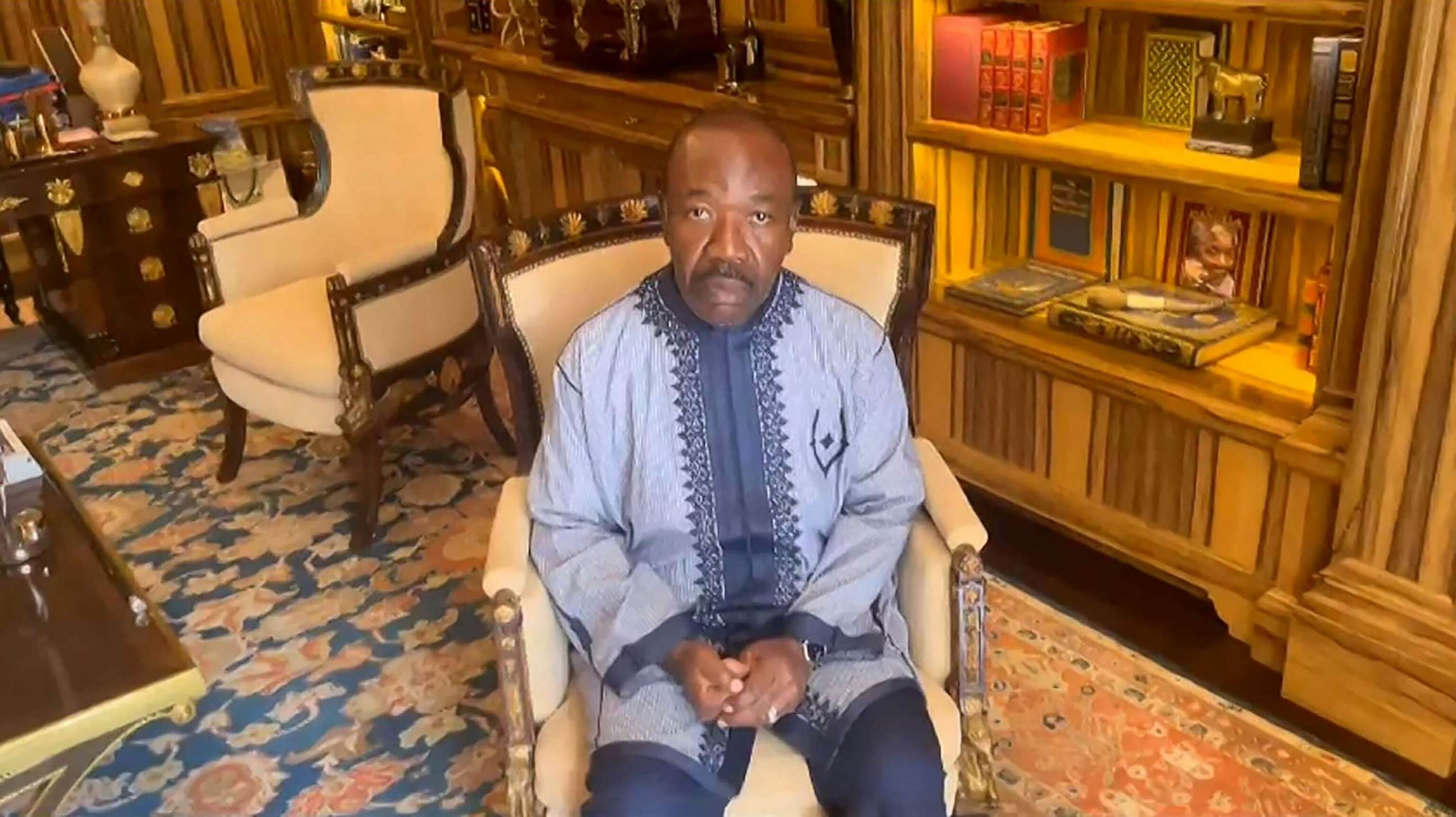Soldiers in Gabon declare coup after president wins reelection for 3rd term
The coup, if successful, would be the eighth in the region since 2020.
DAKAR and LONDON -- A group of soldiers declared a coup d'état in Gabon on Wednesday, claiming to have seized power from a president whose family has ruled the oil-rich Central African nation for decades.
The military junta made the announcement on state television hours after Gabonese President Ali Bongo Ondimba won reelection for a third term in a vote that was criticized by international observers. A dozen uniformed soldiers, who introduced themselves as members of the Committee of Transition and the Restoration of Institutions, described the election as fraudulent and said the results were "canceled," all borders "closed until further notice" and state institutions "dissolved."
"Our beautiful country, Gabon, has always been a haven of peace. Today, the country is going through a serious institutional, political, economic and social crisis," the soldiers said in the televised statement. "In addition, irresponsible, unpredictable governance has led to a steady deterioration in social cohesion, threatening to drive the country into chaos."
"We call for calm and serenity among the population, the communities of sister countries settled in Gabon, and Gabonese living abroad," they added. "We reaffirm our commitment to respecting Gabon's commitments to the national and international community."
The coup leaders said the president was under house arrest in his residence in the Gabonese capital of Libreville. Bongo, 64, became president of Gabon in 2009 following the death of his father, who had ruled since 1967.
Throngs of people took to the streets in Libreville on Wednesday to celebrate the apparent coup.
By the afternoon, the junta announced that it has appointed Gen. Brice Oligui Nguema as chairman of the committee and president of the transitional government. Nguema has ordered the restoration of fiber optic cable and international radio and TV signals across the country. Starting Thursday, traffic restrictions would be lifted from 6:00 a.m. to 6:00 p.m. local time, the junta said.

The U.S. Embassy in Libreville issued a security alert on Wednesday saying it "has received reports the borders and airport are currently closed and commercial flights to and from Libreville will reportedly be suspended until further notice." U.S. citizens in the Gabonese capital were advised "to shelter in place, limit unnecessary movements around town, and continue to avoid transiting the downtown and Presidential Palace area."
A senior official with the U.S. State Department told ABC News on Wednesday that American diplomats at the embassy in the Gabonese capital were still assessing the situation on the ground and conferring with consular officials from other likeminded countries. All staff members of the U.S. embassy there are accounted for, according to the official.
Some gunshots were fired in Libreville as the coup attempt unfolded earlier Wednesday, but as a means of intimidation rather than direct violence, the official claimed, saying the situation was still developing.
If successful, Gabon's coup would be the eighth to occur in West and Central Africa since 2020. It comes about a month after a military junta in Niger ousted the West African nation's democratically elected government. Both Niger and Gabon have close ties to France, their former colonizer.
Speaking to reporters in Paris on Wednesday, a French government spokesperson condemned the coup attempt in Gabon and said the government was following the situation closely.
The African Union, a bloc consisting of 55 member states located on the African continent, including Gabon, released a statement on Wednesday "strongly" condemning the attempted coup in Gabon and calling for "a rapid return to democratic constitutional order in the country."

Meanwhile, the United States stopped short of calling developments in Gabon a "coup." Speaking to reporters in Washington, D.C. on Wednesday, White House spokesperson John Kirby referred to the situation in Gabon as an "attempted military takeover" that was "deeply concerning."
"We're going to watch this closely," Kirby added, "and we're going to continue to do everything we can to support the ideals, the democratic ideals that are expressed ... by African people throughout the continent. That's going to be our focus."
Kirby said it was "too soon" to say whether there was a "trend" or potential "domino effect" underway after the recent wave of coups in the region.
Later Wednesday, U.S. Department of State spokesperson Matthew Miller issued a statement on the "evolving events in Gabon," calling on "those responsible" to "preserve civilian rule."
"We remain strongly opposed to military seizures or unconstitutional transfers of power," Miller said. " We urge those responsible to release and ensure the safety of members of government and their families and to preserve civilian rule. In addition, we call on all actors to show restraint and respect for human rights and to address their concerns peacefully through dialogue following the announcement of election results. We also note with concern the lack of transparency and reports of irregularities surrounding the election."
Gabon, home to more than 2 million people, is located on the western coast of Central Africa, sharing borders with Equatorial Guinea, Cameroon and the Republic of Congo. The country is a member of OPEC, with a production of 181,000 barrels of crude oil per day.
-ABC News' Shannon Crawford and Ben Gittleson contributed to this report.




